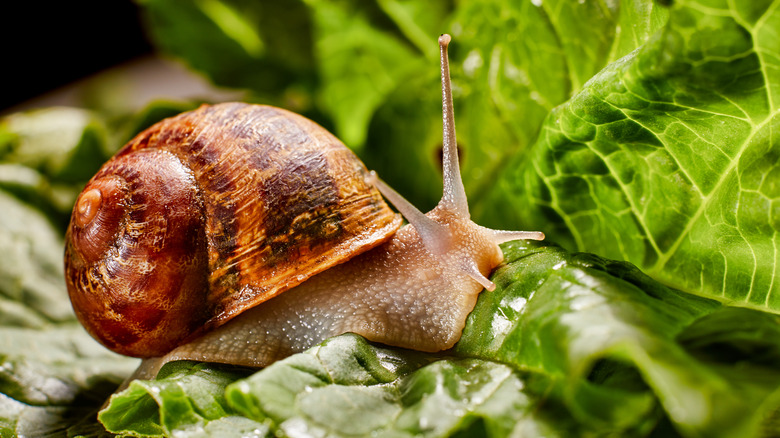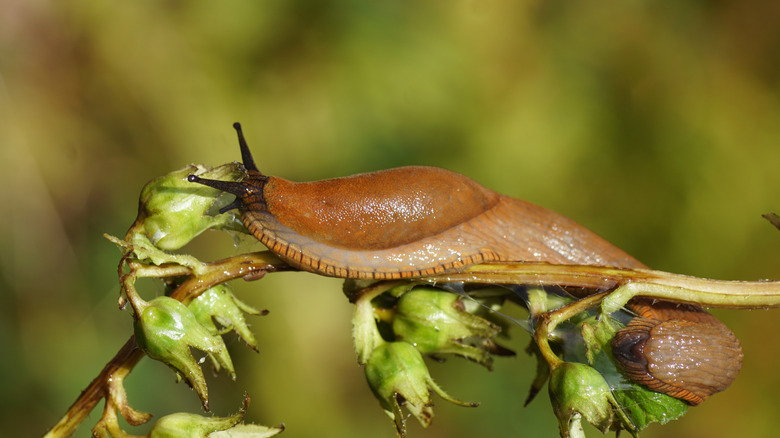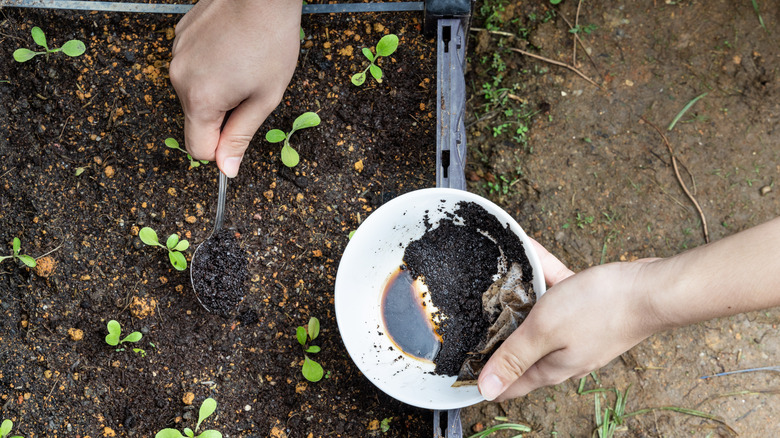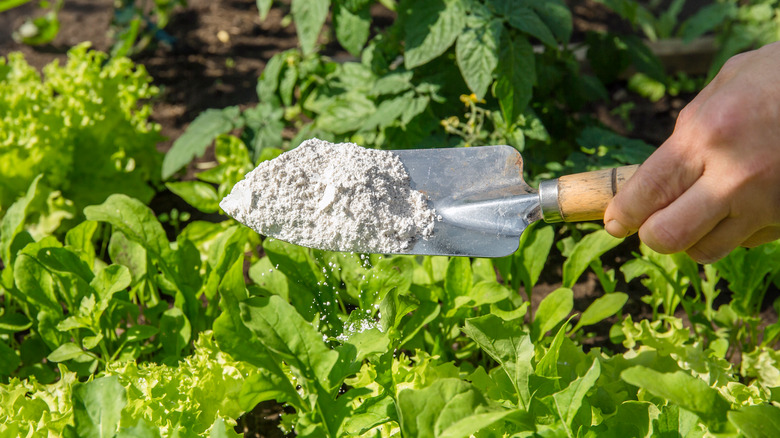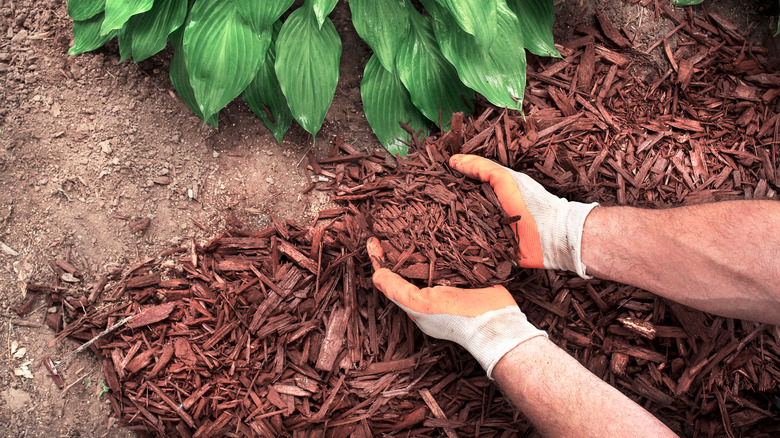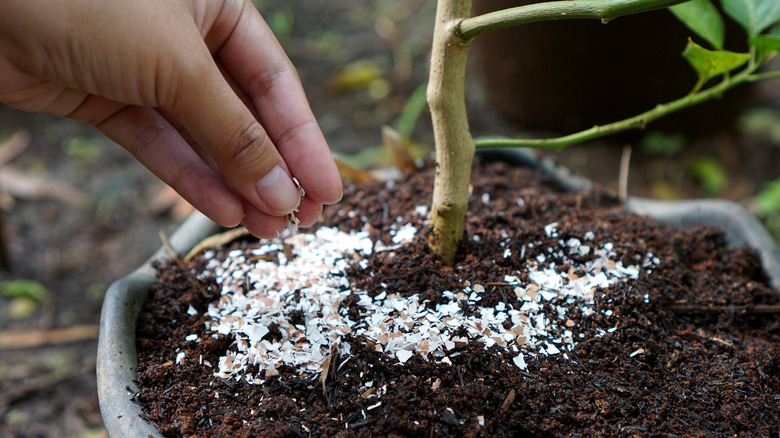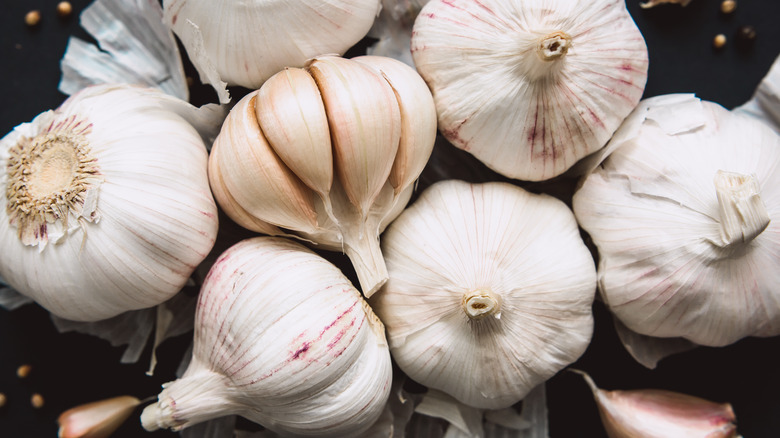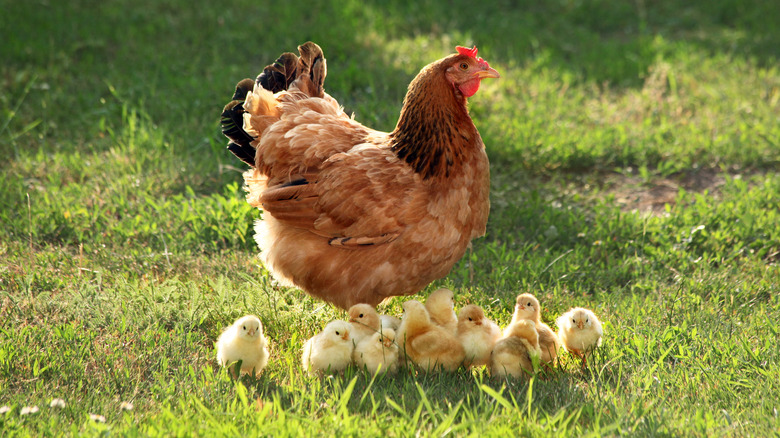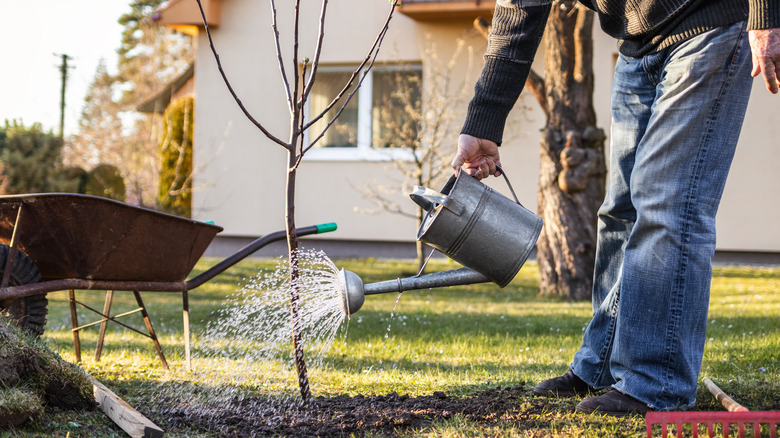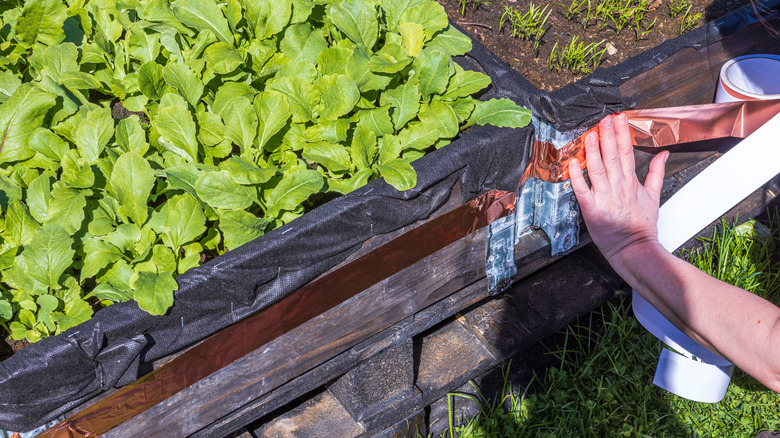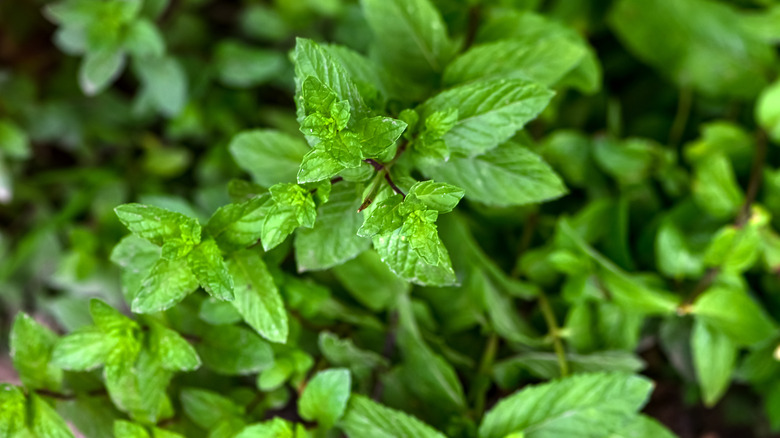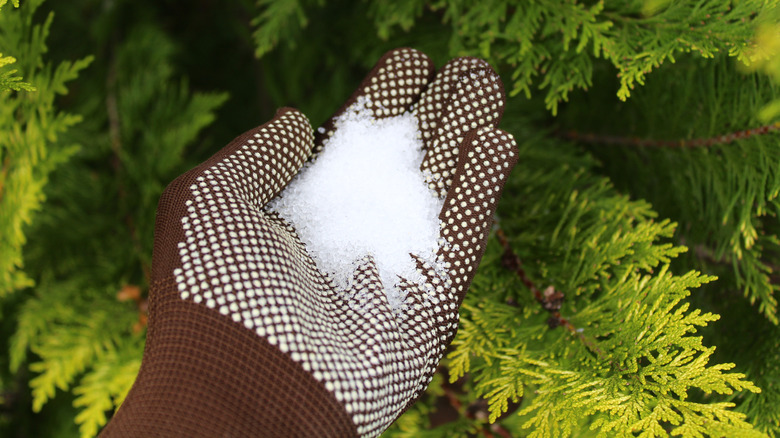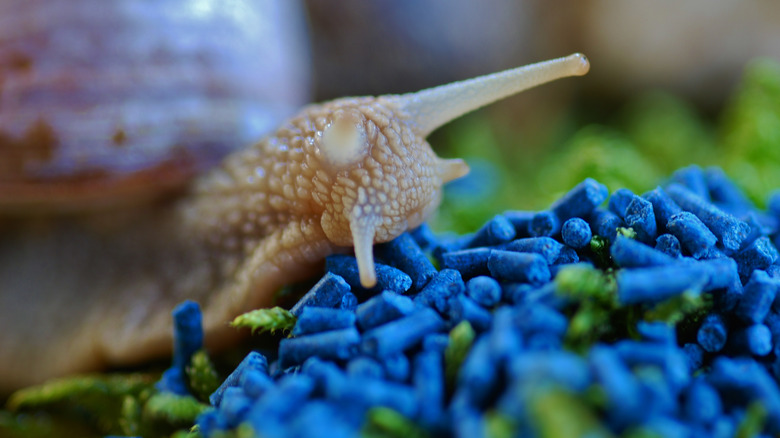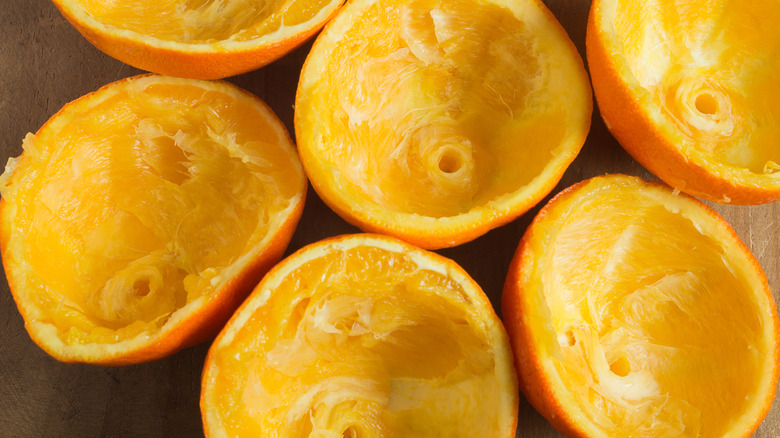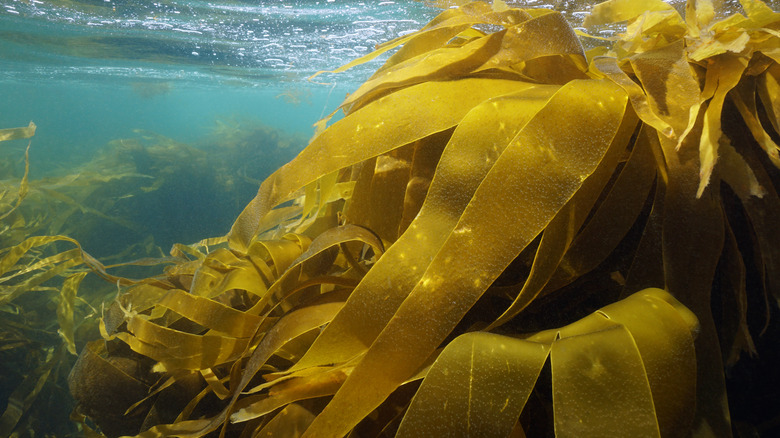Tips For Keeping Snails And Slugs Out Of Your Garden
We may receive a commission on purchases made from links.
Snails and slugs are somewhat of a natural enemy for many home gardeners, found in garden beds, large in-ground gardens, and flower beds alike. Snails and slugs do have their uses in a garden, Growfully stating that a small slug population can actually benefit a garden, as the little insects not only clean up garden debris but are also a great food source for creatures that are quite beneficial to your garden, like frogs, toads, birds, and more. Furthermore, both snails and slugs provide extra fertilization to your garden through waste, and are believed to help predict weather cycles as well, notes Farm From Home.
That being said, snails and slugs can very quickly get out of hand. Despite their small size and slow movements, the creatures are incredibly quick eaters and can destroy most of your garden overnight. Both insects like to eat the stems of plants and crops, as well as seedling stems, which will kill them off. They also like to eat soft crops like berries. If you notice the slug and snail population in your garden is getting out of hand, don't worry, there are a plethora of natural, easy, and organic ways to efficiently remove them.
Manually remove them by hand
The first and simplest way to remove both snails and slugs from your garden is to simply remove them manually, points out Install-It-Direct. While this seems straightforward enough, there are a few parameters to follow and keep in mind. First and foremost, either gear up with gloves or be prepared to get a little slimy handling the creatures. Second, this process will take a little time and patience, or a lot, depending on how bad the problem is. If you're only noticing a few select snails or slugs, simply pick them up and either get rid of them by moving them to another location in your backyard, at least 20 feet away from affected crops and flowers.
There are a few downsides to this method, besides it being time-consuming (and a little gross). One, while slugs and snails are notoriously slow movers, they do get around and may eventually find their way back to your garden. Second, you may not notice small slugs and snails, which will continue to do damage. This method isn't permanent or preventative, but it is free.
Coffee grounds
This next method is also quite easy and very cost-effective, and that is to sprinkle coffee grounds either on the soil or around the perimeter of your plants, per Aumann's. This method has quite a few benefits, both for your garden and bank account. First and foremost, this can be done with used or leftover coffee grounds, meaning it's both a free and zero-waste method. Second, it's non-lethal to slugs and snails. Lastly, your garden won't only benefit from the lack of pests, but the coffee grounds will also nourish your soil.
To use coffee grounds to prevent slugs or snails, simply sprinkle the coffee grounds either on top of the soil of your plants or a particular plant, around the perimeter of your garden, or both. Slugs and snails will be deterred by the coffee grounds and look elsewhere for a snack. Consider taking time to let your coffee grounds dry out, as snails and slugs like moisture, as do many other pests, and wet coffee grounds will only add to that.
Beer traps
Another incredibly effective method of removing and preventing snails and slugs from damaging your garden is to set up a trap using beer, recommends Gardener's Path. Slugs and snails are very attracted to the scent of beer, making it an incredibly effective bait. Keep in mind that this method is fatal and will require regular maintenance.
To set up the beer trap, first, acquire any beer and a container. The container should be shallow enough for the insects to climb into, so opt for either a shallow plastic container or a snail and slug-specific trap. Since this may be a permanent feature of your garden, there are plenty of cute options you can and may want to choose from.
Fill the trap with beer, and look for dead snails and slugs in the morning, making sure to promptly dispose of them. Refill the beer as needed. This will kill any existing snails and slugs and prevent others from wreaking havoc on your garden. Don't set this trap up too close to crops or plants, though, as the snails and slugs may decide to have a little munch before their beer bath.
Diatomaceous earth
A non-lethal and organic way to prevent snails and slugs, as well as many other pests, from getting into your garden is by regularly applying diatomaceous earth to the perimeter of your garden, advises Best Plants. Diatomaceous earth is a substance that can be easily found at garden centers in a white powder form and is made from the fossilized remains of diatoms, a microscopic type of green algae that has a shell texture similar to glass. Creatures like snails and slugs will avoid crossing its path since it has a similar texture to walking over glass for them.
Diatomaceous earth is completely safe for you and your garden, though. If you're growing crops, opt for a food-grade brand to ensure it's safe to eat. Simply apply the powder around the perimeter of your plants or your garden/garden bed. You'll need to reapply often, though, as it loses its effectiveness once wet.
Texture and layer your garden
Snails and slugs aren't the most mobile creatures and generally prefer moving along smoothly, even terrains. Keeping this in mind, an easy, organic, and non-lethal way to prevent slugs and snails from entering your garden is to layer and texture it with wood chips, bark, gravel, or similar, according to Install-It-Direct. This can even be to the benefit of your garden, as textural garden additives like mulch can help your plants self-regulate their moisture levels.
For this method, pick one or a combination of textured ground cover. Either add it densely to the perimeter of your garden, around individual plants, or all over. This isn't a guaranteed method of preventing snails and slugs from getting into your garden, but it will definitely dissuade them, and adds extra protection in combination with other methods. Make sure to check the chips, bark, or gravel often to make sure you or another creature hasn't disrupted it and accidentally provided an in for snails and slugs.
Egg shells
This next method not only prevents snails and slugs from getting into your garden, but it's super beneficial to your plants and crops, as well as super cost-effective and zero waste. According to Aumann's, crushed-up eggshells are an incredibly effective method of deterring snails and slugs from your garden, as the broken shell texture is too sharp for them to move across.
Simply save your leftover eggshells and either crush them by hand with a rolling pin or mortar and pestle or grind them up in a blender or food processor — in this case, the coarser the better. Add them around the base of plants or around your entire garden. As they break down, they'll add extra nutrients and natural fertilizer to the soil. This method does require occasional refreshing as the eggshells break down or are blown away. It also relies on you eating a lot of eggs. Seashells can be used as an alternative or in addition to the eggshells.
Garlic
According to Gardener's Path, garlic is an incredibly effective repellent of snails and slugs and is fatal for the brave few who try to pass through a garlic barrier. There are a few options for using garlic to repel and kill snails and slugs. Garlic oil can be applied in a circle around crops, but if you need to apply it regularly, this can be costly — a one-gallon container of garlic oil can cost $65 on average (via Amazon). That being said, most garlic oil comes in spray form, so it's a little more cost-effective.
You can also make your own garlic spray, per SFGate. Crush six cloves of garlic, combine with a gallon of boiling water, steep overnight for a basic preventative spray, or puree two bulbs of garlic and combine with 1/2 cup of water for a stronger spray. Alternatively, for smaller gardens, you can lay a barrier of crushed-up garlic cloves around plants to prevent snails and slugs.
Keep chickens or ducks
Another great way to prevent slugs and snails from congregating in your garden is by keeping around their natural predators, both to kill off any existing pests as well as prevent them from coming back. For those living in rural areas or cities that allow them, Best Plants recommends getting some chickens or ducks, which will happily eat any slugs or snails they find. Don't be flippant about this decision, though, as chickens and ducks are a lot of work to care for and maintain.
Alternatively, most common birds are also natural slug and snail predators. If you live in a more residential, suburban area, or ducks and chickens are too much work or too expensive, simply install a few bird feeders around your garden. Birds can cause damage to your garden, warns SFGate, so make sure to take precautionary measures (bird netting, staking, etc.) to prevent them from causing more harm than good.
Water your garden early in the day
A big part of preventing snails and slugs from overtaking your garden is understanding why they're attracted there in the first place, as well as knowing how they act and behave. Snails and slugs are both attracted to moist garden beds, notes Install-It-Direct, as they can move on the wet soil much easier than when it's dry.
In a similar vein, snails and slugs both prefer to munch on your crops during the nighttime. If you water your garden from midday to evening, you're providing ideal circumstances for snails and slugs to make a midnight snack of your plants. To help curb this, water your crops as early in the morning as you can. The heat from the sun will help evaporate the water, creating a drier garden at night. This won't get rid of snails and slugs entirely, but it will certainly help deter them.
Create a copper barrier
This next method is best for raised garden beds or potted plants, but it can certainly be modified for an in-ground garden. As a bonus, it's entirely humane and non-lethal. According to Gardening Know How, copper and snails/slugs do not mix — when they try to crawl over the metallic material, it creates a shock-like reaction and is an incredibly efficient deterrent.
There are a few methods for applying copper to your garden. The easiest and most common is applying copper tape, which is an adhesive strip of copper that can be easily applied around raised garden beds or potted plants. For in-ground gardens, the tape may not be entirely effective. Instead, look for copper mesh and apply it around the stems of plants. Keep in mind that copper does deteriorate over time, so this isn't a permanent solution for keeping snails and slugs out of your garden.
Deterrent herbs
Another non-lethal way to deter snails and slugs from your garden is by planting herbs they don't like. Garlic has already been covered, but there are plenty of other herbs and plants. According to Aumann's, snails and slugs really dislike chives, and many opt to tie a few chive stalks around plants that are particularly vulnerable to snail and slug attacks.
Mint is another favorite for gardeners in deterring snails and slugs. You can plant mint, but it tends to be a bit of a wild grower. Alternatively, you can crush or chop up some mint and sprinkle it around your plants. Other herbs and plants that repel snails and slugs include sage, rosemary, lavender, parsley, and thyme. You can plant them either as a border or periodically dot them between plants. Many gardeners like marigolds for their natural pest repellent properties but do not plant them to deter snails and slugs. The garden pests are actually attracted to the plant. You can, however, use it as a sacrificial or "bait" plant.
Salt or baking soda
This next method, while effective and cost-efficient, is lethal and quite cruel, warns Install-It-Direct. Only use this if you have no qualms about killing the pests invading your garden. All you will need is baking soda and salt. Simply mix the two ingredients together and sprinkle them around your plants. The baking soda and salt will dry out the snails or slugs, which will slowly and quite painfully kill them. This method also requires disposing of the snail and slug corpses, either yourself or through a pest control method like keeping birds.
If this method isn't proving effective, look under your potted plants, advises Gardener's Path. Snails and slugs like to gather under potted plants, where they can hide and avoid pest control methods. You can repel them by applying a layer of Vaseline or another jelly-like substance around the bottom rim and then add a layer of salt. Both of these methods will need reapplication.
Organic slug pellets
While slug pellets may seem like the obvious first choice for repelling slugs and snails from your garden, there's quite a bit of controversy around them. According to Envii, slug pellets use one of two poisons to repel and kill the garden pest — methiocarb (which is banned in multiple countries) or metaldehyde. These chemicals are not only toxic to slugs, though. Children, outdoor pets, and other wildlife can also experience the toxic effects of slug pellets if ingested. They are also not organic.
This is why Aumann's recommends organic slug pellets, which use iron phosphate to repel slugs and snails as opposed to toxic (and sometimes illegal) chemicals and poisons. They are approved for organic gardening and are non-toxic to wildlife and children. There have been a handful of cases of sickness in dogs after ingestion, so take care to monitor any outdoor pets, as well as children, and prevent them from eating the pellets.
Citrus traps
This next method is not only non-lethal but actually quite enjoyable for slugs and snails, and as a bonus, it's zero-waste. Garden Gate recommends setting out citrus fruits — either whole and cut in half or just the rinds — in your garden. Opt for old, rotting, or cheap fruit if using it whole. The snails and slugs in your garden will flock to the citrus fruit. In the morning, simply pick up the remains of the fruit, discard the slugs and snails how you see fit, and either trash or compost your rinds.
If you're worried about the snails and slugs leaving the rind and going back out into the garden, combine them with other methods for added efficacy. Citrus rinds are also great bait for trapping methods, notes Gardner's Path, especially in combination with other bait like lettuce or hiding spots, like plywood planks, garden pots, etc.
Mulch with fresh seaweed
This last method not only repels snails and slugs without killing them, but it's incredibly beneficial to your soil, and if you live near the ocean, it can be quite inexpensive, too. According to Plant Care Today, snails and slugs don't like seaweed, as it has a high salt content, and will avoid it. As such, you can use seaweed-like mulch around the base of your plant or mix it into the top layer of your soil (via Aumann's).
As a bonus, seaweed is a broad-spectrum fertilizer, notes Eartheasy, and helps plants grow quicker and stronger. Don't worry about potential diseases, either, as seaweed and land plants don't have any shared ailments. When used as mulch, like in this method, it has the added benefit of not growing weeds the way bark mulch does. Unfortunately, dried seaweed or kelp products for your garden will not be as effective as freshly foraged seaweed.
